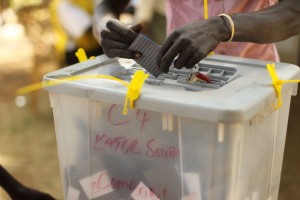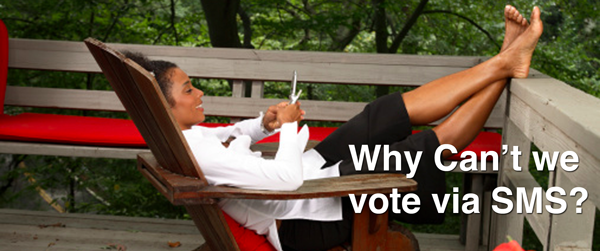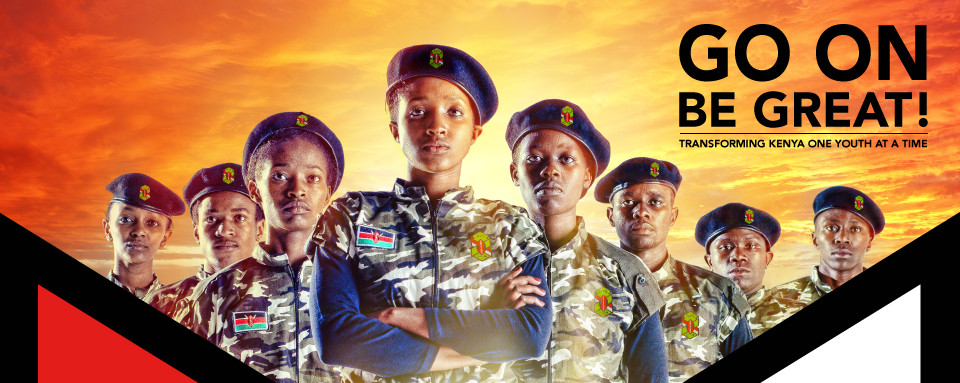In my last post, I promised to share my musings on the Kenyan elections. I did muse a little on this subject at the NDI Conference on Technology and Transparency and in general, the faces of my audience told me that I am too simplistic and that it is impossible. I am not convinced that it is impossible and so, I am sharing it here so that I can be educated – or supported, as the case may be.
The question is this: in this day and age of mobile money and so on, Why exactly can’t we vote via SMS?
As I see it, we live in the days when millions of SMSes are sent to vote for TV contestants every day – Big Brother Africa, Tusker Project Fame, the African Idols etcetera. We live in the days when we send literally Billions of shillings to each other using mobile money. These are the days when it is surprising to meet an adult who does not have a mobile phone. In Kenya 74% of the total population has a mobile phone – meaning just about every adult and many kids.
Hold that thought.
The way elections are generally done in Kenya as in many parts of Africa, is as follows:
The electoral commission spends a good amount of money transporting ballot boxes and papers to schools colleges and social halls across the country, which are commandeered for the purpose. This generally involves hundreds of vehicles (including 4X4 trucks and helicopters) as well as thousands of people – security, clerks and porters. Several thousand other people are contracted to administer the elections directly.
 On election day, Kenyans have to wake up early – often to be at the polling station as early as 3am (to ensure that they vote early). At the polling station when they get to the actual room, they go to one desk where their identities are verified (usually by checking their ID and Voters cards against the [paper] voter registers), they pick their voting papers and take a few minutes to tick their preferred candidates before moving to the ballot box where they insert the ballot paper. In the case of voters who are disabled, invalid, old, near-term pregnant or illiterate, it takes longer to vote. Afterwards, the votes are counted physically well into the night at the polling station with tens of people watching in each polling station (translating to thousands around the country) and after announcement, the results are sent – first electronically, then physically to the elections HQ for tallying. Tallying is not confirmed until HQ has seen the signed results (paper which has to be driven across the country). Somewhere in the midst of all of this, hanky panky is sometimes done and the results are tampered with.
On election day, Kenyans have to wake up early – often to be at the polling station as early as 3am (to ensure that they vote early). At the polling station when they get to the actual room, they go to one desk where their identities are verified (usually by checking their ID and Voters cards against the [paper] voter registers), they pick their voting papers and take a few minutes to tick their preferred candidates before moving to the ballot box where they insert the ballot paper. In the case of voters who are disabled, invalid, old, near-term pregnant or illiterate, it takes longer to vote. Afterwards, the votes are counted physically well into the night at the polling station with tens of people watching in each polling station (translating to thousands around the country) and after announcement, the results are sent – first electronically, then physically to the elections HQ for tallying. Tallying is not confirmed until HQ has seen the signed results (paper which has to be driven across the country). Somewhere in the midst of all of this, hanky panky is sometimes done and the results are tampered with.
You will agree with me that this is really a most fallible process.
So, why can’t we vote via SMS?
The way I would see it working is as follows:
We are all required to register our lines against our ID numbers – which the government have in their records. How about we build a database driven application that has all of our phone numbers, Names, ID card details etc. Working with the mobile Operators, the electoral commission would host it with mirrors visible online. The Application is designed to do the following:
- First, allow us to choose our constituencies. This would be done by SMSing the name of your constituency to a short code that is tied to the electoral application. I am only allowed to choose once.
- Second, on election day, between 8am and 5pm, the application would allow me to choose my seven representatives (Councillor, Senator, Governor, MP, President etc) using USSD menus one after the other.
- Tally the numbers in real time and publish the results every minute – online.
Yes, this is a simplistic solution that has to be bolstered to take care of some aspects like how to help the illiterate etc. But I see it as viable given the number of mobile money users in Kenya and mobile users in Africa. I also see many advantages in saving costs and time. Certainly such a process would considerably cheaper, more transparent and efficient?
Citizens would vote over breakfast and then follow the process of the elections as they go on with their work, be with their families. They would not need to travel to their rural polling station to vote or uproot their lives for this one election.
Tell me why not.
 ADDENDUM (12.09.12): On seeing this post, my good friend Shem Ochuodho, who is currently the senior advisor at the ministry of telecommunications and postal services in Southern Sudan, alerted me that the Kenyan Diaspora has filed a case in court where they have asked that the government use technologically enabled tools to enable the Diaspora to vote. They actually have developed a prototype that shows that this is possible. Read the Full affidavit that they have filed this August or a brief Summary.
ADDENDUM (12.09.12): On seeing this post, my good friend Shem Ochuodho, who is currently the senior advisor at the ministry of telecommunications and postal services in Southern Sudan, alerted me that the Kenyan Diaspora has filed a case in court where they have asked that the government use technologically enabled tools to enable the Diaspora to vote. They actually have developed a prototype that shows that this is possible. Read the Full affidavit that they have filed this August or a brief Summary.




Because we love long and tiresome ways of doing things. I might be with you on this one but can you show us a working prototype? You know? Proof? I'd believe it if a test dummy situation can be done for one constituency and see how it actually would work. Would the application be using internet or just plain old connectivity? Or would it be the Tazama Chapa or Banking survey SMS style? Will connectivity be assured for the 8-5pm duration of election day? Are you sure the system will never be hacked so that someone can vote more than once? So my phone number is my Voter ID number? Does voter registration mean we also register our phones? What if I have two lines? I am also assuming that all phones will be registered to their rightful owners and politicians won't be able to hire inmates of Kamiti Prison to infiltrate the vote? Won't it also kill the social aspect of feeling like you've woken up and done something towards the good of your country? Honestly, as convenient as it sounds I'd rather get up, queue and go press a button (I'm for Electronic Voting), my vote goes straight to IEBC and I go home.
Er… Wambui, read the post again.
Just perish that thought before some dimwit picks it up and flies with it making us spend a couple of billion shillings in an attempt to bring it to fruition.
"Kura ni siri" is a central tenet of democracy. Remote, self-service voting would be the greatest avenue for vote buying and "coerced voting".
Kindly show me a process model that ensures that in ALL cases, you are sending that SMS free of influence and intimidation and that no one is there watching over your shoulder or demanding that you show him the acknowledgement before you get rewarded for voting right. Or that you are the one actually sending the SMS or logging in.
The reason we are so busy trying to deploy a biometric system is to ensure that we have a two factor authentication system, something you have (id card) plus something that you are (fingerprints). The reasons for this allegedly because there were absentee voters including dead ones and also to stem cases of double voting at the last elections. The biometric voting is to ensure that you do actually show up to vote and the cubicle is to ensure that you are doing it alone and that no one has any mechanism of establishing how you actually voted. We even dumped the voters card to ensure that you can buy and destroy the voting cards in zones where you are not competitive.
Another central tenet of democracy is that, not everyone will vote but the ones who do are representative of the entire populace. There should therefore be no extreme pressure for an expensive process for the diaspora to vote, in case you feel that strongly, catch a flight at your cost and come vote.
The big question would be how to ensure that the person who is registered to the phone line is the actual one doing the voting. Otherwise, it would be a good idea… also what about the people who don't have a mobile phone? No one should be left out of the voting process…
I agree Crystal. This system is not without its perils. But that notwithstanding, I want to know why it cant be done. I mean are there really insurmountable obstacles to this?
Al I am so with you on this! We can should and we must, and "Why not!" It would solve many of the logistical problems, not to mention billions of KSH, the faces some of the people in the audience are people whose "party and gravy train" your messing with!
Its great to hear. The question is what do the likes of Bob Collymore think about.
More people have phones that those that will vote. So phones cover quite well.
Idd, Absolutely. In fact you have answered some of Wambui's questions above with that response.
It is possible. today M-PESA holds a data base which transactions are verified on presentation of an ID and yet we trust billions to that system but can not trust our political choices. We interact with money everyday and trust it to M-PESA yet our politicians whom we see once we can not imagine. Ok down to issues.
1) Registration of persons is a must = link to the registrar of persons DB to verify citizenry.
2) Registration and association of SIM cards= service provider data bases must be shared to link citizen to SIM card
3) Registration of voting center and verification that you are from that county.
Issues here are
– Double voting multiple SIM cards resolvable by point 2.
– Verification of voting age as persons under 18 have phones
– Verification of voter
– Phone support of USSD
– Complexity of an SMS menu due to literacy.
would be fun to try it out.
My celebrated kindred Al, you have an exciting perspective, against the backdrop that indeed technology is inexorable. But before I get overly enthused by the prospect, i would like to entertain some thoughts and questions. First, not every Kenyan mortal is mob-tech savvy. Secondly, is it possible you presume that every Kenya (with the Constitutional Right to Vote) owns a mobile phone? Now, given that not all parts of Kenya are powered (electricity), some are extremely remote, and painfully inaccessible, and as though that is not punishment enough, most such areas cannot even afford network availability. A case in point is the inner parts of Waamba in Maralal and other such places. Will they have to travel in search of network first?
How about the perfectly illiterate folks?
Then i also know of majority of traditional Maasais' for instance, who have no ID cards etc…will they suffer disenfranchisement?
The other thing is that people own more than one phone numbers, so possibly registered with the omission of a middle name or first name,or even sir name, such person could technically be having "different" identities. For IEBC to verify all mobile votes and corroborate them with ID numbers, it may take ages. Then suppose the IEBC systems breaks down in the process of voting? I know as a country we have many firsts, including mobile money, but perchance we may not be so ready to take such risk with voting, conscious of the fact that our elections are deeply emotive, divisive and occasionally chaotic. Finally, how can the IEBC tallying be verified and trusted?
Bro. Al Kags,
Fully in agreement! This is precisely part of our prayers in court as Diaspora. Two relatively secure methods can be deployed:- i) secure SMS-based and/or ii) secure web-based/online system. For a simple prototype of the latter, sample https://www.kenyansabroadvote.com/index.html. More in the pipeline…
Also attached is a copy of the Court Prayers.
Best regards and thanks for sharing,
Shem
Every outstanding achievement in this world, goes the saying, was once considered impossible. I am, however, a bit guarded on embracing this as a solution due to what you have alluded somewhere in your argument where you say that this is still a simplistic solution.
Well, the road to hell goes another saying, is paved with people with good intentions. Such a good idea especially in Kenya where voters are feared to resurrect and vote, can really be abused. After all, ours is not a generation of the infallible. SMS voting is prone to technology rigging. I can easily ‘help’ my illiterate grandmother vote or exploit persons with visual impairment. When you imagine how many illiterate, elderly persons and persons with visual impairment we have in the country, you realise this thing really alter results if abused.
My other fear is actually on another form of rigging where aspirants can give cash to people who can technology show that they have voted for them. Aspirants with deep pockets can easily win. The ‘beauty’ with the manual voting is that it is very personal. You can’t know who someone voted. With SMS voting, I am afraid, you can easily know.
For Kenya to adopt this technology, again conscious of our experience with counting votes, we have to make it really foolproof.
And end the gravy train for those involved in supplying logistical and material support for the election process!! Perish the thought………..!
But on a more serious note, we are now in a world where the leading mobile service provider in Kenya has well over 18 Million subscribers and is pretty much able to handle the numbers. Some limited integration window during the 8 hour voting period with other providers should be possible without overloading the system so long as a solution to 'packeting' the data generated so that it is released in tranches is possible.
I may not be that tech savvy but in an age where people are able to access their bank accounts through their phones on fairly complicated IT platforms with firewalls and all kinds of security features and with thousands of complex transactions per minute a platform for online SMS voting should not be that diffucult to achieve.
This idea has been with me hence astonishing to get it on this website.I support it with full force if only Kenyans will be educated on responsible use of this technology.YES WE CAN but only if we decide to work on it responsibly as patriotic members of our nation_Kenya.
I had this idea in mind and hence astonishing to get it on this website.I support it with full force if only the people of Kenya are going to be educated on how to use it responsibly.YES WE CAN but only if we decide to do it as patriotic and responsible members of our nation.KENYATTA UNIVERSITY
Kudos Really.
We can work towards that. Well… Let’s work towards that.